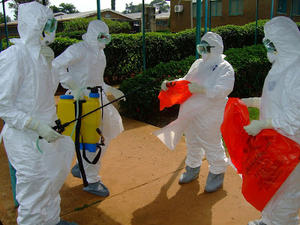Published 2 October 2014
A board of biological safety experts has warned that many U.S.hospitals may be unprepared to dispose of Ebola-related waste safely, should the disease arrive in any great number within the mainland. Many waste management companies are refusing to perform any service where waste items – such as soiled sheets and medical protective gear involved with treating the disease – would have to be handled. They cite federal guidelines which state that such items would require special training and packaging by people with hazardous materials training.

Government regulations require Ebola waste handled only by specially trained personnel // Source: algareda.com
A board of biological safety experts has warned that many U.S.hospitals may be unprepared to dispose of Ebola-related waste safely, should the disease arrive in any great number within the mainland.
Insurance Journal reports that many waste management companies are refusing to perform any service where waste items – such as soiled sheets and medical protective gear involved with treating the disease – would have to be handled. They cite federal guidelines which state that such items would require special training and packaging by people with hazardous materials training.
Because of the symptoms of Ebola, which include heavy vomiting and diarrhea, the risk of large amounts of infected material is high, making the need for quick and proper disposal even greater.
“At its peak, we were up to 40 bags a day of medical waste, which took a huge tax on our waste management system,” said Dr. Aneesh Mehta, of Emory University Hospital in Atlanta.
This past August, the hospital treated two U.S. missionaries who had contracted the disease in West Africa. Stericycle, the waste management company contracted by the hospital, refused to handle materials related to the patients.
Because of this, Emory staff contained the waste at the hospital for six days until the U.S. Center for Disease Control and Prevention (CDC) was able to broker a deal with the company. The incident proved that many hospitals may not be able to cope with an outbreak of the disease on a logistical level.
Another problem is the difference in classification of the disease by the CDCand the Department of Transportation (DOT), which also regulates the handling of infectious materials. While the CDC does allow for the containment of materials in the way Emory stored them — in leak-proof containers — the DOT requires special packaging due to its classification of Ebola as “Category A agent.”
CDC Spokesman Tom Skinner said that the agency is not currently aware of any packaging approved for handling that particular virus, leading to the belief of waste management groups that they are not approved or required to handle it.
“For this reason, it would be very difficult for a hospital to agree to care for Ebola cases — this desperately needs a fix,” said Dr. Jeffrey Duchin, the chair of Infectious Diseases Society of America’s Public Health Committee.
The CDC and DOT are reportedly working on resolving the issue, and the Environmental Protection Agency (EPA) is also involved in discussions.
http://www.homelandsecuritynewswire.com/
No comments:
Post a Comment